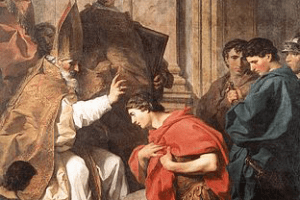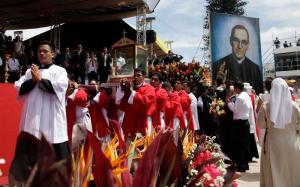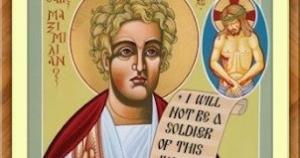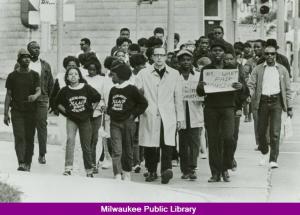
A provincial governor in fourth-century Italy, Ambrose was drafted to serve as bishop before he was even baptized. Reluctant to serve the chuch at first, he took the task seriously when he finally accepted the call. Ambrose gave away all of his possessions, took up a strict schedule of daily prayer, and committed himself to the study of Scripture. Called from the world of politics to serve the church, Ambrose was a leader who spoke truth to power and did not back down, insisting that “the emperor is in the church, not over it.” (From Common Prayer: A Liturgy for Ordinary Radicals, December 7)
This is the second in the series on heroes of the faith that my favorite prayer book asks us “ordinary radicals” to join in our prayer lives. To a diverse audience of Protestants and Catholics, the authors explain the idea of praying with a very Catholic idea: We never pray alone. For Christians there is a new “we.” “Our family is transnational and borderless.” And, We must connect our prayers to the rest of God’s children throughout the world and through all time and space. These are people who “are reading the same Scriptures, singing the same songs, praying the same prayers, and grafting their lives onto the same old story.”
Ambrose, governor turned bishop
Ambrose was born into a wealthy family, the son of the prefect of the province of Gaul in the Roman Empire. By age 30 he was governor of Italy’s northern provinces. Immediately he had to deal with theological controversy between Arians and those who held what became the orthodox position. Christianity Today says he was “so well regarded that both sides supported him.” CT continues:
When the bishop of Milan (an Arian) died, Ambrose attended the meeteing to elect a replacement, hoping that his presence would preempt violence between the parties. Much to his surprise, both sides shouted their wish for him to be their replacement.
Ambrose had not yet been baptized. In eight days and after the people thought fit to arrest him, Ambrose went from unbaptized to bishop.
Cultured defender of the faith
Ambrose turned out to be a fierce opponent of Arianism and defender of orthodoxy. Ambrose knew Jewish, Greek, and Latin classics and contemporary Pagan as well as Christian writings. He kept this broad background with him and often incorporated neo-Platonic ideas in his sermons. His approach to the Old Testament was highly allegorical, and his sermons were masterpieces of classical literature.
A young man named Augustine, skeptical, searching, and leaning toward Arianism, heard of the famous Ambrose. After four years of Ambrose’s teaching, Augustine accepted baptism and went on to become that age’s greatest expositor of the orthodox faith.
The many-talented Ambrose also left his mark on the music of the Church. He promoted hymn singing during liturgies and “bewitched” the people of Milan with the Eastern melodies of the hymns that he wrote. You can listen to one of Ambrose’s hymns here:
On becoming bishop Ambrose renounced his worldly wealth. He was a persuasive preacher of the ascetic life. Nobles forbade their daughters from attending his sermons for fear they would give up their marriageable status for a life of virginity.
Conflicts with the emperor
The politically powerful Ambrose set a pattern for the relation between Church and state. As Christianity Today puts it, “He wrestled with three emperors—and won each time.” Two incidents especially indicate two different sides of his legacy.
A charioteer from Thessalonica was a people’s favorite, but authorities imprisoned him for homosexuality. A riot broke out and the governor and some others were killed in the chaos. The Charioteer went free.
In revenge Emperor Theodosius announced another chariot race but had something quite other in mind. His soldiers locked the gates on the assembled crowd and within hours killed 7,000 people. Ambrose demanded that Theodosius do public penance and forbade him to attend church until he did. It was the first time that Church triumphed over state.
Britannica reports a second incident that doesn’t seem so benign on Ambrose’s part. Theodosius had punished a bishop for burning a Jewish synagogue. Ambrose rebuked the emperor!
Ambrose remained on friendly terms with Theodosius, who died in Ambrose’s arms. In actions, sermons, letters, and funeral orations for Valentinian II and Theodosius, he established the concept of a Christian emperor. A son of the Church, the emperor serves “under orders from Christ.”
Credit for image of Ambrose and Theodosius: Archdiocese of Washington












